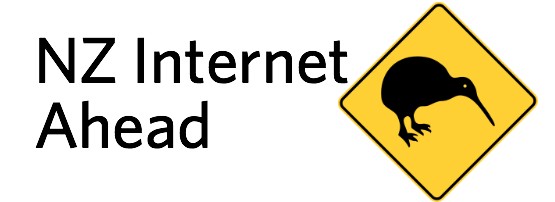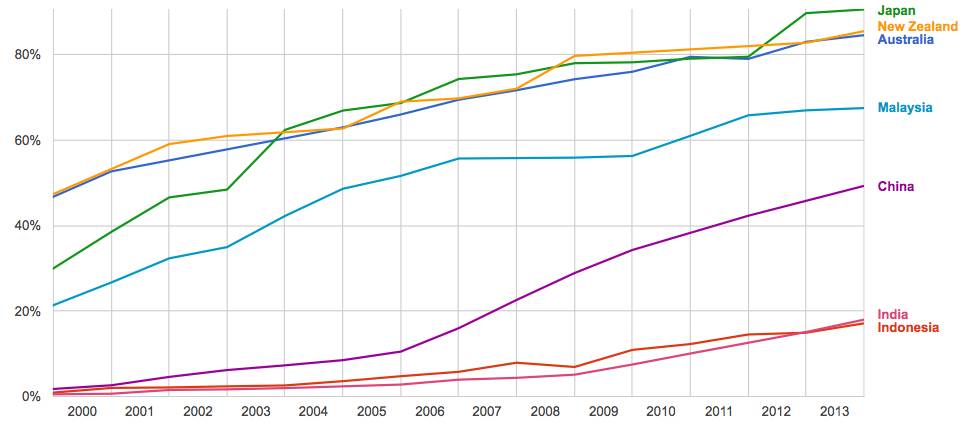
In the lead up to APRICOT 2016, which will be held for the first time in New Zealand, we thought we’d build on our successful IDSeries last year and share some of the interesting Internet stories from the land of the long white cloud.
New Zealand has always had a reputation for punching above its weight.
For a country with a population of around 4.5 million people, it has produced three Nobel laureates; two America’s Cup winners; arguably the most dominant rugby team in the world; and mountaineer Edmund Hillary, the first person, along with Tibetan climber Tenzing Norgay, to reach the summit of Mt. Everest.
Many of these (and other notable achievements) have required New Zealanders to travel and work overseas, due in part to the country’s geographic isolation. Notably, this ‘brain drain’ is not just associated with New Zealand’s highest achievers. In 2005, an OECD study reported that the economy faced a significant challenge in retaining its skilled workers, with nearly a quarter of them having left the country.
Over the years, successive New Zealand governments have put in measures to offset this emigration and have indeed attracted many skilled workers to almost neutralize the ‘drain’. Having said this, the New Zealand government, like other governments facing a similar situation, would be more inclined to retain talent than to exchange it – the fiscal impact for every skilled worker that leaves New Zealand is USD 10,000 through foregone taxes, education, and healthcare costs – and in many ways, the Internet is helping them to achieve this.
For New Zealand, the Internet in its early days provided a means for its academics to communicate and collaborate with other academics around the world, meaning they didn’t need to travel or emigrate to undertake their research.
From these beginnings, it slowly seeped into the general public, with early adopters using it to great effect to help sustain, and soon expand, their businesses and services. Now, over 85% of the population connects to the Internet in New Zealand either at school, work or home, with four out of five people spending one hour or more online at home every day, and most accessing the Internet via mobile devices.
Over 85% of New Zealanders are connected to the Internet – World Bank
Greater usage has, consequently, had a positive impact on the New Zealand economy too. Like other economies around the world, it has become bolstered by the Internet’s broad ranging impact on society, so much so that a study funded by Google and Internet NZ predicts the Internet has the potential to provide $34 billion in productivity returns for New Zealand’s economy.
With penetration almost at saturation, attention has now turned to improving people’s access to broadband Internet—as of October 2015, there are 1,926,000 broadband connections—and Internet speed—as of 2014, the average connection speed for broadband was 7 Mbit/s (ranked 42nd in the world).
To achieve these outcomes, the government has developed a plan to connect 75% of New Zealanders to ultra-fast broadband, with download speeds of up to 100Mbps, by 2020. Such an outcome can only be made possible with the help of New Zealand’s network operators, who have developed and continue to maintain and expand the country’s Internet capacity from its humble beginnings in its universities.
What will the New Zealand telecommunications environment look like in 2020?
This year, APRICOT 2016 will be held in Auckland, New Zealand’s largest and most populous city.
As we count down to the conference, we spoke to some local Internet champions to learn about the history, challenges, and opportunities of the Internet in New Zealand.
Join us this week as we share the stories of some of New Zealand’s past and present leaders in the industry, and learn how the Internet is continuing to allow New Zealand to achieve great things.
- John Hine – Light-bulb moment allows research community to make a difference
- Frank March – Educating not regulating key to Internet success in NZ
- Keith Davidson – Moving with the Times to compete
- Ellen Strickland – Establishing NetHui, the people’s event
- Jonathan Brewer – Network attracts, inspires and enables New Zealand and Pacific
The views expressed by the authors of this blog are their own and do not necessarily reflect the views of APNIC. Please note a Code of Conduct applies to this blog.


Great progress New Zealand. Collaboration is the key to success.